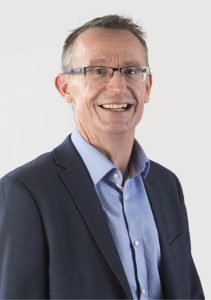 Rory Murphy FRICS, Commercial Director, VINCI Facilities, chairs the RICS’ new member engagement, experience and value (MEEV) working group. Here, he brings Sara Bean up to date with the ethos and progress of the group
Rory Murphy FRICS, Commercial Director, VINCI Facilities, chairs the RICS’ new member engagement, experience and value (MEEV) working group. Here, he brings Sara Bean up to date with the ethos and progress of the group
Launched in 1868, the Royal Institution of Chartered Surveyors (RICS) is one of the leading institutes within the built environment, representing 140,000 members operating out of 146 countries. Over the past year it has been hit by a governance scandal that led to the resignation of four senior figures, including CEO Sean Tompkins and President Kath Fontana. This followed the publication of an independent review by QC Alison Levitt that found four non-executives who had raised concerns over an audit in 2018 had been wrongly dismissed.
Now operating under a new interim team, the RICS is awaiting the results of an independent review being carried out by Civil Servant, Lord Michael Bichard into its governance and purpose. One of the most eye-catching comments from Bichard’s summary of responses so far was that many members felt that power has shifted from members to senior staff at RICS to such an extent that “RICS was no longer a member-led organisation”.
He has also referred to the survey ‘Defining our Future’, carried out prior to the governance crisis, which pointed to a decline in member engagement in recent years. The RICS had in fact, already taken steps to address this issue, and now, running separately to the Bichard review, has set up a Member Engagement, Experience and Value (MEEV) working group. It is chaired by Rory Murphy, Commercial Director at VINCI Facilities and a fellow of RICS who has long been associated with the FM group at RICS.
He explains he was approached to take on the role before the governance crisis hit: “The Bichard review is looking at governance and purpose which doesn’t really cut across what we’re doing. Our group is absolutely focused on membership feedback. And it isn’t about us coming up with our own ideas, it’s more about responding to specific issues that members have raised and working with the management team within the RICS to help develop solutions which we then road test. We’re very much a working group.”
Defining our futures was carried out in early 2021 and comprised round tables and consultations to gather feedback on the Institute.
Says Murphy: “What came through was how difficult it was [for members] to become engaged with RICS. Membership experience was another issue, including transactional challenges like renewing your subs or contacting the call centre and there were concerns about transparency.
“If you wrap all those issues together and it’s in the heart of a pandemic, people were starting to question the value for money. ‘I pay my fees and what am I getting for it, what’s in for me? If the experience isn’t great and the engagement isn’t great, what am I getting?’”
WORKING GROUP
Murphy was approached to chair the Member Engagement, Experience and Value (MEEV) working group by the exec team who’d noted his previous successful chair of the responsible business in real estate report.
He says: “I’d helped the RICS for over 12 years on the FM side and I’ve got so much time for the team there. I did genuinely want to come and help so it wasn’t much of an ask, though I wasn’t 100 per cent sure what I walking into.
“I think they knew I’d take an honest, pragmatic approach as I’m not interested in the kudos of doing it but just wanted to help make things better. I was delighted but slightly terrified to be asked but I was aiming to help shape it to make a difference. The group is fundamentally about the membership and addressing very real concerns about Engagement, Experience and Value but I also want to help the teams that work at the RICS be proud of the institution and the tireless work they do.”
The group is made up of three members of the governing council from Germany, the Caribbean and Australia and five world regional board chairs, hailing from UK & Ireland, Europe, Asia, the Americas and the Middle East. There are also three UK national board chairs and three board chairs from around the world, including Poland, Hong Kong and UAE along with a representative from Matrix in the UK to represent the younger generation.
“It’s all very cosmopolitan,” says Murphy. “And with a total of 15 on the group including me, it isn’t unwieldly, so we can get together once every couple of weeks. We have a clear programme we work with as we go through proposals and how we operate, given the global nature means some of our meetings are at strange times.
“Even with governing council members in the group there is no hierarchy and by including the world regional board leads they’ve a connection to their regions and can feedback our progress to their member’s groups. The working group also includes local board leads who are closest to rank and file members, so we’re very member led.
“We also have a good relationship with the exec team who I work with directly, and approach it as a partnership. Also, the RICS staff have been brilliant and they’ve been really good in picking this mantle up and running with it.”
Murphy is keen to point out that the group has anchored its activities to concentrate on responding to member feedback which guards against the group determining its own agenda. The group is also carrying out a gap analysis based on the RICS most recent survey of the profession to check that what people were commenting on a year ago is still applicable now.
Says Murphy: “All of the work we would focus on is 100 per cent anchored on whatever feedback we get and part of my role in ensuring that when these 14 people get together we concentrate on what the membership has told us, what we’re going to do to solve it and what is the output.
“It isn’t a group to which people address queries, we’ll respond to the feedback we’ve had and how to address that. It’s broad in its initiatives but knows its boundaries, which are areas that relate to the experience the members have, the value for money they perceive and how engaged they feel. That’s the frame of it and what we’re not trying to do here is address concerns about how the organisation is governed or what is its purpose – that is not for this group.”





